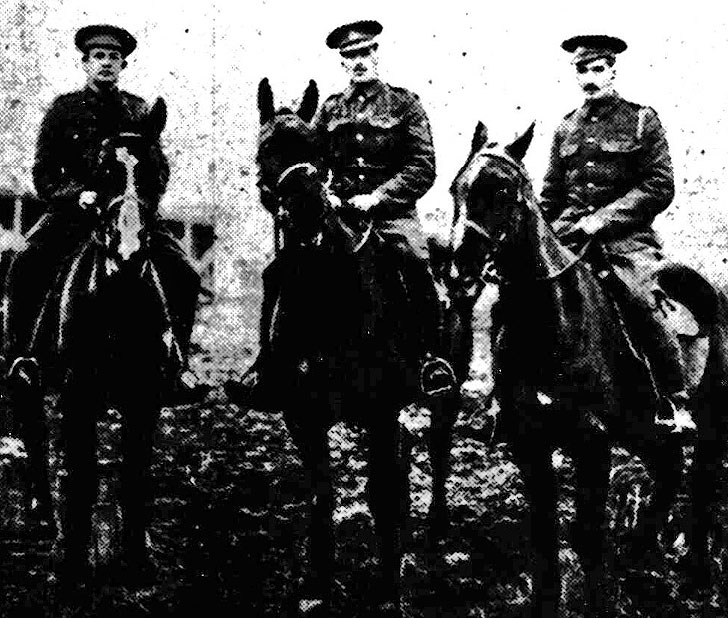Second Lieutenant Clifford Russell Boyd

Boyd (right) with Horsemen Ritchie Browne and Harry Craig at Antrim in late 1914 (from the Belfast Weekly Telegraph of 5 December 1914)
Clifford Russell Boyd was born on 11 July 1893 at Claremount House, Ardenlee Avenue, Belfast, the fourth or fifth of ten children of commercial traveller (later distiller and wholesale wine and spirit merchant) Samuel Wilson Boyd and his wife Annie (nee Magowan). He was educated at Campbell College, Belfast, including a year in the school's Officer Training Corps. By 1911 he was living with his family at Claremount and working as secretary in a linen business.
Boyd enlisted in the North Irish Horse at Belfast on 1 October 1914 (No.1227 – later Corps of Hussars No.71289). He gave his trade as "whiskey business" though on another form later in the war he wrote "partnership linen business".
Boyd played as a three-quarter in a rugby match between the North Irish Horse and a Belfast team on 27 February 1915 (they lost 11-0).
On 2 June 1915 he embarked for France with a group of reinforcements and was posted to C Squadron.
On 7 January 1917 he was charged with being absent from his post whilst on duty as traffic control sentry, and was docked 3 days' pay.
Boyd applied for a commission on 5 May 1917, with a preference for the Royal Flying Corps. On the application form, when asked if he had any experience in mechanical, electrical or motor engineering, he wrote "Yes. I have had experience in motor engineering, repairing my own car and bicycles." He left France for cadet training in the UK on 20 August, first posted to the RFC Depot at South Farnborough and then to the No.2 School of Military Aeronautics at Christ Church, Oxford.
Boyd was commissioned as a 2nd lieutenant on 6 December 1917 and posted to the General List for duty with the Royal Flying Corps. After flight and gunnery training, on 3 July 1918 he was sent to France, where he was posted to No.1 Squadron of the Royal Air Force, flying S.E.5a fighter planes. On 9 August while on an afternoon offensive patrol he was engaged in combat by hostile aircraft and was forced to land, fortunately uninjured.
On 5 February 1919 he returned to England and three days later was transferred to the 'unemployed list'.
He died in 1979.
Boyd's younger brother, Cecil Vincent also served in the war, as a lieutenant in the 8th Battalion, Royal Irish Rifles. He was killed in action at Cambrai on 23 November 1917.

Lieutenant Cecil Vincent Boyd, from www.menbehindtheglass.co.uk
